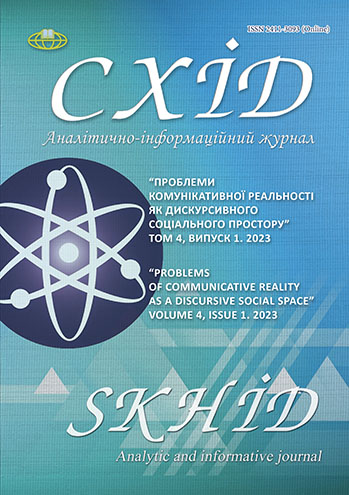The discursive nature of modern science: philosophical understanding
DOI:
https://doi.org/10.21847/2411-3093.2023.4(1).277240Keywords:
science, discourse, technoscience, social turbulence, postclassical dis-course, postacademic discourse, science of the 2nd modeAbstract
The article attempts to find out the patterns of adequate discursive interpreta-tion of science in conditions of social turbulence. For this, based on the socio-communicative methodology, the author makes sense of the relationship between science and philosophy, and also characterizes the state of the modern scientific debate about science in domestic and foreign scientific discourse in such fields as understanding the tasks of post-nonclassical science (O. Polishchuk, I. Do-bronravova, G. Haken), possibilities of reality transformation by means of techno-science (H. Bashlyar, B. Latour, V. Maryniuk, V. Melnyk), risks of post-academic science development (J. Ziman, O. Kuz, V. Cheshko), modes/types of science (M. Gibbons, H. Novotny, S. Limoges, L. Ryzhko). The main result of the study is the author's definition of the strengths and weaknesses of science in a socially turbu-lent space. Among its strengths, the author attributes such properties as increased scientific attention to applied problems, a higher degree of scientific self-organization, multitasking at different levels and within different types of relation-ships, communicativeness. Among the weaknesses are the risks of science losing fundamentality, disciplinary boundaries, which is accompanied by a loss of clarity in the methodology and criteria of scientific success, as well as the risk of replac-ing scientific truth with non-academic success criteria, such as the economic suc-cess of science, political correctness, etc. It is concluded that in the situation of global transformations and uncertainty which humanity is currently experiencing, new characteristics of science are developing, which help to understand the risks and dangers of moving away from traditional academicism.
Downloads
References
Dobronravova, I. S. (2006). Fundamentalna nauka – fundamentalna osvita. Filosofiya osvity, 3 (5), 134-144 (In Ukrainian).
Drotyanko, L. G. (2000). Fenomen fundamentalnoho i prykladnoho znannya (Postneklasychne doslidzhennya). Kyiv: Publishing House of the European University of Finance, Information Systems, Management and Business (In Ukrainian).
Krüger, H. P. (2016). Jürgen Habermas, interviewt von Christoph Demmerling und Hans-Peter Krüger. Deutsche Zeitschrift für Philosophie, 64(5), 806–827. https://doi.org/10.1515/dzph-2016-0061
Krymskyi, S. (2003). Nauka yak fenomen tsyvilizatsiyi. Visnyk NAN Ukrayiny, 3, 7–20 (In Ukrainian).
Kubalskyi, O. (2022). Rol nauky u stanovlenni komunikatyvnoyi paradyhmy humanitarnoyi polityky v Ukrayini. Visnyk Zhytomyrsʹkoho derzhavnoho universytetu imeni Ivana Franka. Filosofsʹki nauky, 2 (92), 82-93 (In Ukrainian). https://doi.org/-10.35433/PhilosophicalSciences.2(92).2022.82-93
Kubalskyi, O. (2022). Social Turbulence as the Scientific Phenomenon: Operational and Strategic Change. Philosophy and Cosmology, 29, 17-25. https://doi.org/10.29202/phil-cosm/29/2
Kuz, O. M. & Cheshko, V. F. (2017). Filosofiya nauky. Kharkiv: HNEU named after S. Kuznetsia http://repository.hneu.edu.ua/handle/123456789/17865 (In Ukrainian).
Leydesdorff, L. (2009). The Communication of Meaning in Social Systems. Systems Research and Behavioral Science. 26 (1), 109–117 https://www.leydesdorff.-net/meaning0704/meaning0704.pdf .
Melnyk, V. (2011). Lyudynovymirnist nauky ta yiyi tsyvilizatsiyni vyklyky. Visnyk Lvivskoho universytetu. Seriya filosofsko-politolohichni studiyi. 1, 9–22 (In Ukrainian).
Melnyk, V.P. & Maryniuk, V.G. (2013). Lyudyna i tekhnonauka v konteksti noosfernoyi paradyhmy. Visnyk Lvivskoho universytetu. Seriya: Filosofski nauky. 16, 3–18 (In Ukrainian).
Nicolescu, B. (2014). Methodology of Transdisciplinarity, World Futures, 70:3-4, 186-199, https://doi.org/-10.1080/02604027.2014.934631.
Panchenko, O. A. (2019). Sotsializatsiya osobystosti v umovakh informatsiynoyi turbulentnosti. Aktualni problemy psykholohiyi, 52 (1), 87–92 (In Ukrainian) http://www.appsychology.org.ua/data/jrn/v1/i52/16.pdf
Polishchuk, O. P. (2010). Postneklasychna nauka: sotsialno-humanitarnyy povorot. Visnyk Zhytomyrskoho derzhavnoho universytetu imeni Ivana Franka, 53, 3–7 (In Ukrainian).
Roco, M. C., and Bainbridge, W. S. (2002). Converging Technologies for Improving Human Performance: nanotechnology, biotech-nology, information technology and cognitive science. National Science Foundation, Report, 2002. 468 p. https://obamawhitehouse.archives.gov/sites/default/files/microsites/ostp/bioecon-%28%23%20023SUPP%29%20NSF-NBIC.pdf
Rubanets, O. M. (2007). Suchasni aspekty lyudynomirnosti v rozvytku postneklasychnoyi nauky. Visnyk NTUU «KPI», Filosofiya. Psykholohiya. Pedahohika, 2, 42–46 (In Ukrainian).
Ryzhko, L. V. (2001). Dva znachennya termina «tekhnonauka». Totallogy-XXI. Postneklasychni doslidzhennya: naukovyy zbirnyk, 5, 213–222 (In Ukrainian).
Ryzhko, L. V. (2019). Prohramno-tsilovi naukovi doslidzhennya: dyskurs pro perspektyvy ta problemy. Totallogy-XXI. Postneklasychni doslidzhennya: naukovyy zbirnyk, 36, 5–24 (In Ukrainian) http://nbuv.gov.ua/UJRN/totallogy_2019_36_3 .
Voznyuk, N. V. (2013). Filosofska refleksiya suchasnoyi naukovoyi kartyny svitu. Visnyk KHNPU imeni H. S. Skovorody. Filosofiya, 2 (40), 46–57 (In Ukrainian).
Yermolenko, A. (2016). Dyskurs v arkhitektonitsi movnoyi prahmatyky. Filosofska dumka, 4, 69-86 (In Ukrainian).
Ziman, J. (1996) ‘Post-Academic Science’: Constructing Knowledge with Networks and Norms”, Science & Technology Studies, 9(1), pp. 67–80. https://doi.org/10.23987/sts.55095
Zlenko, N. N. (2015). Worldview significance of NBICS-convergence technologies. Philosophy of science: traditions and innovations, 1, 11-20 (In Ukrainian).
Downloads
Published
How to Cite
Issue
Section
License
Copyright (c) 2023 Олег Кубальський

This work is licensed under a Creative Commons Attribution-NonCommercial-NoDerivatives 4.0 International License.
1. Authors bear responsibility for the accuracy of facts, quotations, numbers and names used.
2. Manuscripts are not sent back.
3. The publisher does not always agree with the authors' opinion.
4. The authors reserve the right to authorship of the work and pass the first publication right of this work to the journal under the terms of a Creative Commons Attribution-NonCommercial-NoDerivatives 4.0 International License. This license allows others to distribute (copy) the published work for non-commercial purposes, provided there is mandatory attribution to its authors and a link to the first publication in our journal.
5. The authors have the right to conclude separate supplement agreements that relate to non-exclusive work distribution in the form in which it has been published by the journal (for example, to upload the work to the online storage of the journal or publish it as part of a monograph), provided that the reference to the first publication of the work in this journal is included.

